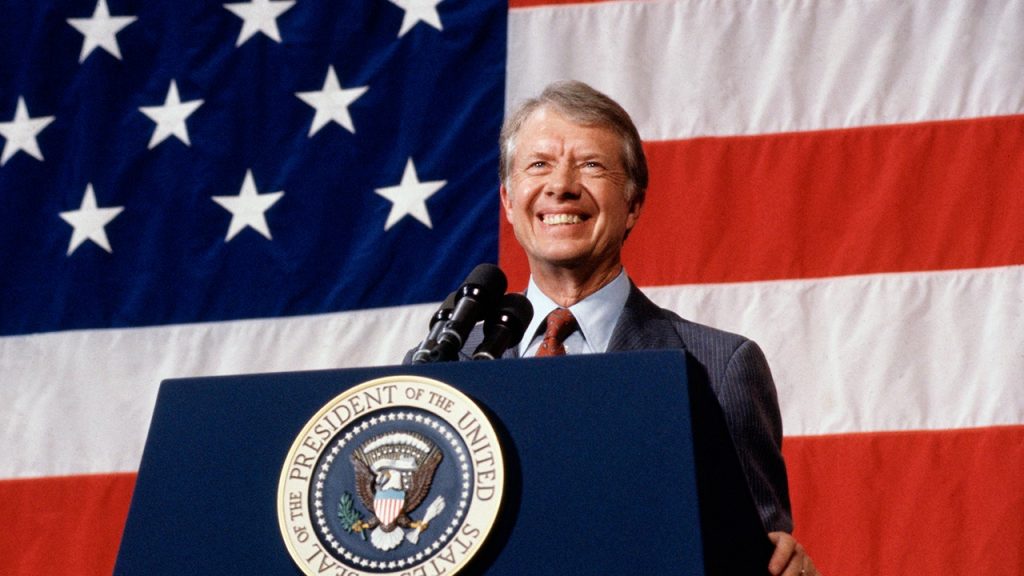The passing of former President Jimmy Carter at the age of 100 elicited a wave of bipartisan tributes from members of Congress, who lauded his lifetime of service to the nation and the world. From his early days as a naval officer to his tenure as Georgia’s governor and ultimately his presidency, Carter’s dedication to public service was a recurring theme in the condolences offered by lawmakers. Leaders on both sides of the aisle, including House Majority Leader Steve Scalise and Senate Majority Leader Chuck Schumer, expressed their profound respect for Carter’s humility, commitment to justice and equality, and his unwavering belief in the American people. His post-presidency work with Habitat for Humanity, building homes for those in need, was particularly highlighted as a testament to his compassionate nature and dedication to improving the lives of others.
Carter’s legacy extends beyond domestic borders, encompassing his significant contributions to global peace and human rights. His role in brokering the Camp David Accords, a landmark achievement in Middle East diplomacy, was acknowledged by Speaker Mike Johnson as instrumental in creating a more peaceful world. Lawmakers from both parties underscored the impact of Carter’s post-presidency endeavors, including his work with The Carter Center, which has championed human rights and democracy across the globe. This unwavering commitment to humanitarian causes, coupled with his deep faith, resonated deeply with those who paid tribute, solidifying his image as a man of principle and compassion.
The outpouring of respect transcended political divides, with prominent Republicans joining Democrats in celebrating Carter’s life. Incoming Senate GOP leader John Thune praised Carter’s dedication to public service and his enduring partnership with his wife, Rosalynn. The bipartisan nature of the tributes reflected Carter’s ability to connect with people from all walks of life and his commitment to serving the common good, irrespective of political affiliation. His humility and unwavering dedication to his principles earned him respect from across the political spectrum, showcasing his enduring influence and the unifying power of his legacy.
Georgia’s congressional delegation, representing Carter’s home state, offered particularly poignant tributes. Their remarks reflected a deep sense of pride in Carter’s Georgia roots and his rise from humble beginnings to the highest office in the land. Representatives Mike Collins and Austin Scott highlighted Carter’s deep connection to Georgia, emphasizing his agricultural background, military service, and the enduring impact he had on the state. These tributes underscored the profound influence Carter had on his home state, both during his time in office and in the decades that followed, serving as an inspiration to generations of Georgians.
Georgia’s Senators, Jon Ossoff and Raphael Warnock, also offered heartfelt tributes, reflecting on Carter’s commitment to democracy, human rights, and his deep faith. Senator Warnock shared personal anecdotes about his interactions with Carter and his wife, Rosalynn, painting a picture of a man who remained grounded and approachable despite his significant achievements. These personal reflections further humanized Carter, highlighting his genuine warmth and his connection to his community. The senators’ remarks underscored Carter’s enduring legacy as a champion of human rights and a man of deep faith, emphasizing his profound impact on both the national and international stage.
The resounding sentiment expressed by members of Congress was one of profound respect and admiration for a life dedicated to service. Carter’s humility, integrity, and unwavering commitment to justice and equality were recurring themes in the tributes. His post-presidency work, particularly with Habitat for Humanity, further cemented his legacy as a man driven by compassion and a desire to make a tangible difference in the lives of others. The bipartisan nature of the outpouring of respect underscored Carter’s ability to transcend political divisions and inspire unity, leaving behind a legacy that will continue to inspire generations to come.

